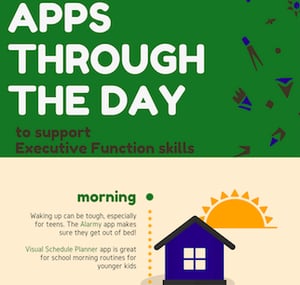Disclaimer: Cramming the night before a test is never the best strategy. These tips are only to help you at the last minute when necessary, not to give you a reason to delay preparing well for a test.
The Scenario: It’s Sunday night. You’ve had a long, fun weekend and then you realize you have a  history test Monday morning...uh oh…OMG!!!! You start to feel like it’s the end of the world, maybe consider bribing your teacher, or maybe even think of skipping school tomorrow.
history test Monday morning...uh oh…OMG!!!! You start to feel like it’s the end of the world, maybe consider bribing your teacher, or maybe even think of skipping school tomorrow.
Don’t worry, you are not alone. Oversights like this can happen once in a while, even when you’re trying your best to keep your planner up to date. (Congrats - you’re human!)
Most high school students are busy juggling homework, sports, extra-curricular activities, the social scene, adolescent pressures, and tests/exams. At this time of year, it’s common to feel a little burnt-out with all those demands - and there’s also the awkward start-back-up again feeling to deal with, happening after winter or spring breaks. What should a student do when that “uh oh” moment occurs and they need to cram for an exam the night before? Cramming at the last minute is not an optimal method to study; however, here are some useful tools to have in your Academic First Aid Kit when you’re in crunch mode (and hopefully, that's rare!).
3 Steps to Managing a Last-Minute Test-Prep Crisis
1) Stay calm - Your brain cannot simultaneously panic and learn. You’re in academic “save yourself” mode and in order to do that, you have to access your frontal lobes - the thinking part of your brain - not the primitive “fight or flight” part of your brain.
2) Find the right place to work - Optimally, set yourself up in a well-lit place with no distractions. Don't get too comfortable and relaxed. Lying in your bed while studying may seem like a great idea, but when you need to extract every bit of knowledge from your study materials, you want to be alert and upright (maybe even standing up if you’re likely to drift off).
3) Allow for sleep - You think you can pull an all-nighter, I know, but sleep is the most important thing you can do the night before an exam. Studies have shown that we remember much more after 6 hours of sleep - and we perform more poorly in high-pressure situations without sufficient sleep.
Academic First Aid Kit for Students
1) First Aid Study Tool: Self Control or Stay Focused - A must-do if you know you’ll find yourself wandering to websites that are off-mission for your objective - preparing for that test in the morning. These apps take the heavy-handed approach and completely block your access to those tempting sites for a pre-determined amount of time. Sure, you could use a more subtle app the reminds you not to play on your phone while studying, like Forest, but this is crunch time and it calls for a more definitive approach, right? Oh, and turn on the “do not disturb” mode for your devices. Really. I know you want to commiserate with classmates about your predicament but save it for after the test. You need to channel your energies in a more productive manner.
2) First Aid Study Tool: DKDK (Do Know, Don’t Know)- Determine what you already know vs. what you don’t know yet. Sometimes highlighting items on a study guide with a color code can help you zero in on what you need to prioritize: green for “do know” and yellow for “don’t know”, for example. Don’t waste valuable time reviewing what you do know! Given that you’re studying the night before the test, odds are you’re not going to remember every specific detail of the content you’ve learned. Don't attempt to learn everything; focus on things that will get you the most points on the exam. Write down key ideas/formulas and skip the details for now.
3) First Aid Study Tool: Study Aloud - Read your notes out loud. Whisper, shout, sing, rap, tell someone (your pet or even stuffed animals can be a fine audience!). It’s easier to remember something you say, hear, and read - than something you only read. Better yet, quiz yourself aloud. Ask yourself questions from your study guide and answer them out loud. You’ll be staying alert, on target, and reinforcing your knowledge using different regions of your brain - now that’s some bang for your studying buck!
4) First Aid Study Tool: Short Breaks - Take a restorative 5 or 10-minute break every hour so that you can gather your thoughts and let your brain relax from all that intense focus. Splash some cool water on your face, grab a healthy snack, walk around, or try a meditation app like calm.com. (especially if you notice that panicked feeling creeping up again).
Remember that in an ideal world, you would be studying all along in small chunks, eating well, exercising consistently, and getting enough sleep. We all know that the real world for students is full of unexpected twists and turns, though - despite our best intentions for keeping up with our demands. When you are faced with an “uh oh” moment and need to cover a lot of studying ground quickly, keep these Academic First Aid tips in mind.
Finally, ask yourself, "How can I do better test preparation next time?"
Once crunch time has passed, allow for some time to reflect on how that test snuck up on you. What adjustment can you make that might help you avoid that next time? Is it a series of reminders you set up in your google calendar? Is it forming a weekly study group that helps keep you up to date? Is it a highlighted “to do” on your planner? Only you know for sure, through a bit of trial and error experimentation, what will work best for you. In the meantime, take some comfort in the fact that you survived that stressful scenario and know what to do should it ever happen again - and that you can share a few First Aid tips with a classmate who finds themself in a similar position.
photo credit: Shutterstock
 Cara Falconi is an Executive Function coach with Beyond BookSmart. She received her MA in Clinical Mental Health Counseling with a specialization in Expressive Therapy from Lesley University in 2005. She is a certified Special Education and Therapeutic Consultant with over a decade of experience working to help families navigate the process and advise on appropriate placement. Cara has held various positions in private and public schools as a Learning Disability Specialist and Clinical Director. Her expertise is working with children and adolescents who struggle with mental illness, social-emotional challenges, learning disabilities, and Autism Spectrum Disorders.
Cara Falconi is an Executive Function coach with Beyond BookSmart. She received her MA in Clinical Mental Health Counseling with a specialization in Expressive Therapy from Lesley University in 2005. She is a certified Special Education and Therapeutic Consultant with over a decade of experience working to help families navigate the process and advise on appropriate placement. Cara has held various positions in private and public schools as a Learning Disability Specialist and Clinical Director. Her expertise is working with children and adolescents who struggle with mental illness, social-emotional challenges, learning disabilities, and Autism Spectrum Disorders.
 Download our infographic featuring 8 of our coaches' favorite apps for students to help them manage time, stay focused and organized, and be productive.
Download our infographic featuring 8 of our coaches' favorite apps for students to help them manage time, stay focused and organized, and be productive.

